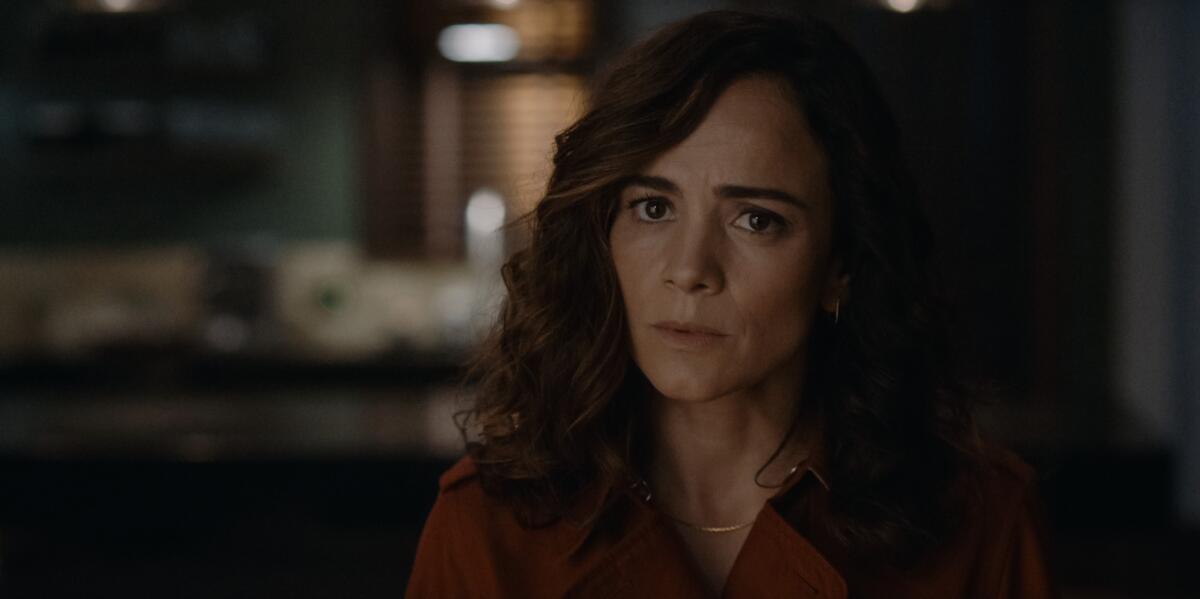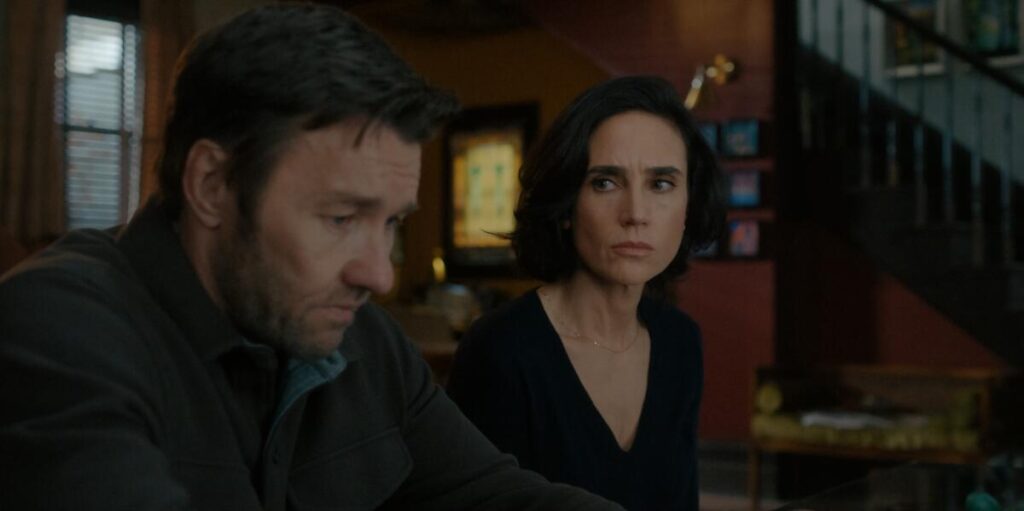Blake Crouch has enjoyably adapted his own 2016 novel “Dark Matter” into a nine-episode series for Apple TV+, which aims to be your destination for classy sci-fi. It’s got nothing to do with “dark matter” except as Shakespeare might have used the phrase to describe some sinister business — “This dark matter doth shade our bright prospects,” something like that.
Pseudoscientifically speaking, this is a parallel realities series, with a dose of domestic drama, some secret project shenanigans and a structure that recalls the Odyssey, in that it’s the story of a man facing monstrous obstacles and personal distractions as he attempts to get back to his wife and son and homeland. A complement of familiar quantum mechanical terms are dropped along the way, with only the hint of a thud: superposition, entanglement, liminal, multiverse — ideas that have become standard sci-plot devices and useful literary metaphors.
Joel Edgerton plays Chicago physics professor Jason Dessen, married to Daniela (Jennifer Connelly) and father to Charlie (Oakes Fegley). Almost everywhere in television except “Abbott Elementary,” teaching is dramatic shorthand for failure, and we do get the sense that Jason is less than completely engaged at work. At the end of a day in which he 1) lectures significantly to half-interested students about Schrodinger’s dead-and-alive cat; 2) interacts with his family, showing us a comfortable household; and 3) learns that his friend Ryan (Jimmi Simpson) has won a million-dollar physics prize, which bugs him a bit, he is abducted and drugged by a masked man and wakes up, as they loved to say in the old Marvel comics, “Trapped in a world he never made!”
“Dark Matter” centers on Jason Dessen (Joel Edgerton), left, who is married to Daniela (Jennifer Connelly), at least in one reality.
(Apple TV+)
Well, not to be coy about it, the man in the mask is — sort of — Jason himself (identified in the book as Jason 2), who has come from a reality in which he decided not to marry Daniela, with that choice creating a whole alternate timeline. (See: the “many worlds” interpretation of quantum mechanics.) Though he becomes a big-shot physicist, he has been drowning in regret to the point of inventing a techno-magical gizmo capable of opening doors to other worlds — seemingly just to find one in which he did marry her, and substituting himself for that Jason. It’s a terrible idea!
In the other world, where Jason doesn’t recognize people who (think they) know him and is confronted with radically different versions of people he (thinks he) knows, it is assumed by the natives that he has lost his mind. For a time, he’s inclined to agree. That is not exactly his beautiful house, and it is most certainly not his beautiful wife inside — it’s beautiful Amanda (Alice Braga), a psychologist attached to the techno-gizmo project. But before long, Jason will realize what’s what and set about figuring how to get back to where he once belonged. Obviously he isn’t going to just stay put, in this or any other alternate Chicago — we’ll visit a few — even though a viewer might be inclined, after awhile, to encourage him to settle. There are some tempting opportunities.
That, of course, would leave his Daniela saddled with Jason 2, who is, after all, a liar, an interdimensional kidnapper and, one would have to say given the false pretenses, a rapist. Obviously no one would expect their mate to be substituted by a simulacrum; still it takes her a bizarrely long time to notice that something’s not quite right with him — longtime couples being finely attuned to variations in behavior — let alone accept that he isn’t the man she married.
There’s little new under the sci-fi sun, and there are echoes in “Dark Matter” of the movies “Sliding Doors,” ”Everything Everywhere All at Once” and the granddaddy of “what if” movies, “It’s a Wonderful Life” (to make that echo louder, it’s on a movie theater marquee, as Jason runs like Jimmy Stewart down the street). There’s the “Star Trek” episode “Mirror, Mirror” (in which bad-world Kirk and good-world Kirk switch places) and the great Fox series “Fringe” and innumerable other films and television episodes that play with parallel worlds and realities.

In another dimension, Jason is married to Amanda (Alice Braga).
(Apple TV+)
“Dark Matter” isn’t subtle. Crouch (whose earlier “Wayward Pines,” about being stuck in a single, town-sized reality, became a Syfy series) doesn’t waste time with subtext — not when he can have the characters spell out his themes of choice and regret. (There’s even therapy.) “Are you happy with your life,” Jason 2 asks Jason 1 as he sends him into unconsciousness, “or have you ever wondered what else you could have been?”
Explaining her latest exhibition — which features alternative paths, double-exposed portraits and a quote from T.S. Eliot (“Footfalls echo in the memory/Down the passage which we did not take/Towards the door we never opened”) — other-world Daniela (a successful artist where “our” Daniela has given up painting) tells the crowd, “Sometimes we ask ourselves the big questions. Who am I? Who could I be?… We all know that our lives are marked by the choices that we make.” (“Dark Matter” wants you to choose love.)
Because the main characters, and a few minor ones, have counterparts in each reality, there is much to keep straight, and no one should blame you if you don’t. (You can’t tell the players without two scorecards, to paraphrase the old saying.) Additionally, for dramatic effect the action will cut between realities without making it immediately clear where we are — a fake-out. It can make you tired after awhile, keeping things sorted, and “Dark Matter” does go on for a while, though Crouch is careful to turn his midlife crisis drama into an action film at regular intervals. Things grow more and more complicated, as the very premise suggest they must, and at some point you may just be wondering how, or even if, Crouch is going to dig his protagonists out of the hole he’s dug for them; I’m sure some of you, smarter than I, will have worked it out.
Edgerton does a good job of delineating sad regular-guy Jason from hyper creepy-guy Jason (without making him too obviously creepy), and from creepy-guy-playing-regular-guy Jason, though, for different reasons, they all can grow wearing at times. (The main reason: the series is too long, almost as long as an entire season of “Doctor Who.”) Connelly is very much a person you might want to search worlds to find; Braga is a ray of sun and sensibility where you might not expect to find one.
As with all science fiction, there are impossible things you’re going to have to accept — or else, it would just be science, I suppose. Crouch has scrupulously tried to patch over the conceptual holes and anticipate your objections. It’s hopeless, of course, but that’s all right.
While it’s poetically evocative, like the beating wing of the butterfly that causes a typhoon, and mathematically pretty, the many worlds interpretation is in any practical sense ridiculous. What counts as a choice anyway? Does a typo in this world create clean copy in multiple others? There are billions of people on Earth deciding things every second, not to mention all the other sentient beings. Is there a world in which my cat is not annoying me right now? (Probably not.)

